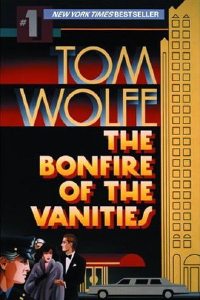 Maybe it was the throwback, sexist conservatism of the 1960's ruling class. Or maybe it was the Hamptons. Or maybe it was that little Campbell McCoy asked her dad the exact same question as Shelby. But discovering Michael Braude's series of "Daddy, what do you do?" books a few weeks back [Shelby Goes To Wall Street, Bruce Learns About Life Insurance, &c.] made me want to turn the beach club scene in Tom Wolfe's 1987 classic The Bonfire of the Vanities into a children's book right. now.
Maybe it was the throwback, sexist conservatism of the 1960's ruling class. Or maybe it was the Hamptons. Or maybe it was that little Campbell McCoy asked her dad the exact same question as Shelby. But discovering Michael Braude's series of "Daddy, what do you do?" books a few weeks back [Shelby Goes To Wall Street, Bruce Learns About Life Insurance, &c.] made me want to turn the beach club scene in Tom Wolfe's 1987 classic The Bonfire of the Vanities into a children's book right. now.
Of course, I had to wait till I got home, and then I had to find the box with my old copy of Bonfire [no, it's not on the shelf.] Wow, were we all so clueless once, and young? The excerpt is below [it's from p.238 of the paperback], but the gist is, Sherman McCoy, the novel's self-important-yet-wildly-insecure, WASP-y bond trading protagonist, is at the beach club in Southampton when his 7-year-old daughter Campbell asks what he does, because her little friend "MacKenzie's daddy makes books, and he has eighty people working for him." Sherman's flustered attempts to explain "dealing in" "bonds" amuse the adults but confuse the kid, then the self-proclaimed Master of The Universe gets undone when his wife Judy steps in to help.
Judy explains that bond trading is like passing around pieces of cake, and that the trader gets to keep some of the crumbs. And when you pass around a whole lot of cake, you amass a big pile of "golden crumbs" yourself. Sherman freaks, Campbell cries, and the uptight club is appalled. Epic fail.
Though I've known plenty of folks who took Bonfire as either a documentary or a handbook for living, I have to imagine this scene as slapstick, and that Wolfe unfairly made his character out to be a buffoon as well as an asshole. Because even taking the last 20 years of market change into account, the golden crumbs analogy is a pretty feeble way of capturing what bond traders actually do.
It really just describes the brokerage business; the golden crumbs were commissions, or margins in the wholesale/retail price gap. Talk to Chuck, and he'll be happy to tell you that these businesses are vastly different today. But what Wolfe failed to convey--or chose not to--is the classic buy low-sell high strategizing; the search for anomalies in the market that can be exploited for significant gain; and the calculated risk taking of trading for the firm's own account. They don't just get crumbs, they find cake no one even knew about, then flip it some poor hungry bastard in exchange for everything he's got.
No, traders deserve a better self-aggrandizing children's book than ol' Tom can give them. And then there's the hedge fund guys, who not only get crumbs from their huge storeful of cakes, they cut off huge slices for themselves before handing them back. Which they keep in an offshore cakebox, far from their crazy old Uncle Sam, who wants to gobble it all up.
So watch for my new book, Sofia Learns About Customizable Alpha Overlay, coming soon to a children's bookstore near you. You are in Greenwich, aren't you?
p.236, uh, buy a copy of The Bonfire of The Vanities? "983 used & new available from $0.01" or pick one up for free in the library bin, I'm sure it's still there.
"Daddy!" Campbell came running toward him, from out of the sand and the dazzling light, onto the deck, between the tables. "Daddy!" She looked absolutely glorious. Now almost seven years, old, she had lost her babyish features and was a little girl with slender arms and legs and firm muscles and not a blemish anywhere. She was wearing a pink bathing suit with the letters of the alphabet printed on it in black and white. Her skin glowed with the sund and exercise. The very sight of her, of this...vision...brought smiles to the faces of his father and his mother and Judy. He pivoted his legs out from under the table and opened his arms. He wanted her to run straight into his embrace. But she stopped short. She hadn't come for affection. "Daddy." She was breathing hard. She had an important question. "Daddy." "Yes, darling!" "Daddy." She could scarecely get her breath. "Take it easy, sweetheart. What is it?" "Daddy...what do you do?" What did he do? "Do? What do you mean, sweetheart?" "Well, MacKenzie's daddy makes books, and he has eighty people working for him." "That's what MacKenzie told you?" "Yes." "Oh ho! Eighty people!" said Sherman's father, in the voice he used for small children. "My, my, my!" Sherman could imagine what the Lion thought of Garland Reed. Garland had inherited his father's printing business and for ten years had done nothing with it but keep it alive. The "books" he "made" were printing jobs given him by the actual publishers, and the products were as likely to be manuals, club rosters, corporate contracts, and annual reports as anything even remotely literary. As for the eighty people--eighty ink-stained wretches was more like it, typesetters, pressmen, and so forth. At the height of his career the Lion had had two hundred Wall Street lawyers under his whip, most of them Ivy League. "But what do you do?" asked Campbell, now growing impatient. She wanted to get back to MacKenzie to give her report, and something impressive was clearly called for. "Well, Sherman, how about it?" said his father with a big grin. "I want to hear the answer to this myself. I've often asked myself what it is you fellows do exactly. Campbell, that's an excellent question." Campbell smiled, taking her grandfather's praise at face value. More irony; and not so welcome this time. The Lion had always resented his going into the bond business instead of the law, and the fact that he had propsered at it only made things worse. Sherman began to feel angry. He couldn't sit here and present a picture of himself as a Master of the Universe, not with his father and mother an djudy hanging on every word. At the same time, he couldn't give Campbell some modest depiction of himself as a salesman, one among many, or even as the chief bond salesman, which would sound pompous without sounding impressive and wouldn't mean anything to Campbell in any case--Campbell, who stood there panting, primed to race back to her little friend, who had a daddy who made books and had eighty people working for him. "Well, I deal in bonds, sweetheart. I buy them, I sell them, I--" "What are bonds? What is deal?" Now his mother began laughing. "You've got to do better than that, Sherman!" "Well, honey, bonds are--a bond is--well, let me see, what's the best way to explain it to you." "Explain it to me, too, Sherman," said his father. "I must have done five thousand leveraged purchase contracts, and I always fell asleep before I could figure out why anyone wanted the bonds." That's because you and your two hundred Wall Street lawyers were nothing but functionaries for the Masters of the Universe, thought Sherman, getting more annoyed by the second. He saw Campbell looking at her grandfather in consternation. "Your grandfather's only joking, honey." He shot his father a sharp look. "A bond is a way of loaning people money. Let's say you want to build a road, and it's not a little road but a big highway, like the highway we took up to Maine last summer. Or you want to build a big hostpital. Well, that requires a lot of money, more money than you could ever get by just going to a bank. So what you do is, you issue what are called bonds." "You build roads and hosptials, Daddy? That's what you do?" Now both his father and his mother started laughing. He gave them openly reproachful looks, which only made them merrier. Judy was smiling with what appeared to be a sympathetic twinkle. "No, I don't actually build them, sweetheart. I handle the bonds, and the bonds are what makes it possible--" "You help build them? "Well, in a way." "Which ones?" "Which ones?" "You said roads and hospitals." "Well, not any one specifically." "The road to Maine?" Now both his father and mother were gigling the infuriating giggle of people who are trying their best not to laugh right in your face. "No, not the--" "I think you're in over your head, Sherman!" said his mother. Head came close to soaring into a whoop. "Not the road to Maine," said Sherman, ignoring the comment. "Let me try to put it another way." Judy broke in. "Let me try." "Well...all right." "Darling," said Judy, "Daddy doesn't build roads or hospitals, and he doesn't help build them, but he does handle the bonds for the people who raise the money." "Bonds?" "Yes. Just imagine that a bond is a slice of cake, and you didn't bake the cake, but every time you hand somebody a slice of the cake, a tiny little bit comes off, like a little crumb, and you can keep that." Judy was smiling, and so was Campbell, who seemed to realize that this was a joke, a kind of fairy tale based on what her daddy did. "Little crumbs?" she said encouragingly. "Yes, said Judy. "Or you have to imagine little crumbs, but a lot of little crumbs. If you pass around enough slices of cake, then pretty soon you have enough crumbs to make a gigantic cake." "For real life?" asked Campbell. "No, not for real life. You just have to imagine that." Judy looked to Sherman's father and mother for approval of this witty description of the bond business. They smiled, but uncertainly. "I'm not sure you're making it any clearer for Campbell," said Sherman. "My goodness...crumbs." He smiled to show he knew this was only lunch-table banter. In fact...he was used to Judy's supercilious attitude toward Wall Street, but he was not happy about...crumbs. "I don't think it's such a bad metaphor," said Judy, also smiling. Then she turned to his father. Let me give you an actual example, John, and you be the judge." John. Even though there was something...off...about crumbs, this was the first real indication that things might be going over the edge. John. His father and mother had encouraged Judy to call them John and Celeste, but it made her uncomfortable. So she avoided calling them anything. This casual, confident John was not like her. Even his father appeared a bit on guard. Judy launched into a description of his Giscard scheme. Then she said to his father, "Pierce & Pierce doesn't issue them for the French government and doesn't buy them from the French government. So Pierce & Pierce's transactions have nothing to do with any thin gFrance hopes to build or develop or...achieve. It's all been done long before Pierce & Pierce enters the picture. So they're just sort of...slices of cake. Golden cake. And pierce & Pierces collects millions of marvelous"--she shrugged--"golden crumbs." "You can call them crumbs if you want," said Sherman, trying not to sound testy, and failing. "Well that's the best I can do," Judy said brightly. Then to her father and mother: "Investment baniking is an unusal field. I don't know if there is any way you can explain it to anyone under twenty. Or perhaps under thirty." Sherman now noticed that Campbell was standing by with a distressed look on her ace. "Campbell," he said, "you know what? I think Mommy wants me to change professions." He grinned, as if this were one of the funniest discussions in years. "Not at all," said Judy, laughing. "I'm not complaining about your golden crumbs!" Crumbs--enough! He could feel his anger rising. But he kept on smiling. "Perhaps I ought to try decorating. Excuse me, interior designing." "I don't think you're cut out for it." "Oh, I don't know. It must be fun getting pouffe curtains and polished chintz for--who were those people?--those Italians you did that apartment for?--the di Duccis?" "I don't know that it's fun particularly." "Well, then it's creative. Right?" "Well...at least you're able to point to something you've done, something tangible, something clear-cut--" "For the di Duccis." "Even if it's for people who are shallow and vain, it's something real, something describable, something contributing to simple human satisfaction, no matter how meretricious and temporary, something you can at least explain to your children. I mean, at Pierce & Pierce, what on earth do you tell each other you do all day?" All at once, a wail. Campbell. Tears were coming down her face. Sherman put his arms around her, but her body was rigid. "It's all right, sweetie!" Judy got up and came over and put her arms around her, too. "Oh, Campbell, Campbell, Campbell, sweetie pie! Daddy and I were only teasing each other." Pollard Browning was looking their way. So was Rawlie. faces at tables all around, staring at the wounded child. Because they were both trying to embrace Campbell, Sherman found his face close to Judy's. He wanted to strangle her. He glanced at his parents. They were aghast. His father stood up. "I'm going to get a martini," he said. "You're all too up-to-date for me."




I remember my Dad trying to explain derivatives and short selling to me when I was a kid as we pored over the stock listings (remember them?) in the New York Times business section.
At the time he specialized in Tax Shelters, another artifact of a bygone financial era, equally incomprehensible to a kid as bond trading: "Huh? You collect money from all these doctors and then you invest in something so they can pay less taxes? Can we go swimming now?"
Of course, my kids are equally baffled by what I do (besides sit in front of a computer all day), consigning it to the large "crazy sh*t that adults do" bin.